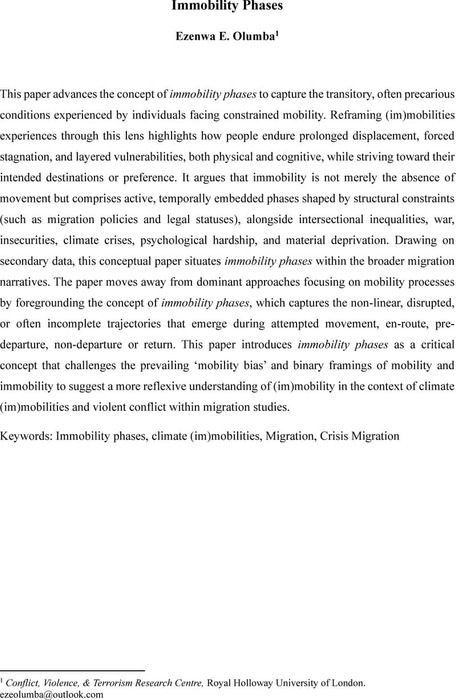preprints.apsanet.org/engage/apsa/article-details/684bedc1c1cb1ecda082c6e8
Preview meta tags from the preprints.apsanet.org website.
Linked Hostnames
9- 21 links topreprints.apsanet.org
- 2 links topolicies.google.com
- 2 links towww.cambridge.org
- 1 link tocreativecommons.org
- 1 link todoi.org
- 1 link toorcid.org
- 1 link totwitter.com
- 1 link towww.facebook.com
Thumbnail

Search Engine Appearance
https://preprints.apsanet.org/engage/apsa/article-details/684bedc1c1cb1ecda082c6e8
Immobility Phases
Immobility Phases
Bing
Immobility Phases
https://preprints.apsanet.org/engage/apsa/article-details/684bedc1c1cb1ecda082c6e8
Immobility Phases
DuckDuckGo
Immobility Phases
Immobility Phases
General Meta Tags
19- titleImmobility Phases | International Relations | APSA Preprints | Cambridge Open Engage
- charsetutf-8
- viewportwidth=device-width, initial-scale=1
- descriptionImmobility Phases
- citation_titleImmobility Phases
Open Graph Meta Tags
5- og:titleImmobility Phases
- og:urlhttps://preprints.apsanet.org/engage/apsa/article-details/684bedc1c1cb1ecda082c6e8
- og:site_nameAPSA Preprints
- og:descriptionThis paper advances the concept of immobility phases to capture the transitory, often precarious conditions experienced by individuals facing constrained mobility. Reframing (im)mobilities experiences through this lens highlights how people endure prolonged displacement, forced stagnation, and layered vulnerabilities, both physical and cognitive, while striving toward their intended destinations or preference. It argues that immobility is not merely the absence of movement but comprises active, temporally embedded phases shaped by structural constraints, alongside intersectional inequalities, war, insecurities, climate crises, psychological hardship, and material deprivation. Drawing on secondary data, this conceptual paper situates immobility phases within the broader migration narratives. The paper moves away from dominant approaches by introducing immobility phases as a critical concept that challenges the prevailing ‘mobility bias’ and binary framings of mobility and immobility to suggest a more reflexive understanding of (im)mobility in the context of climate (im)mobilities and violent conflict within migration studies.
- og:imagehttps://preprints.apsanet.org/engage/api-gateway/apsa/assets/orp/resource/item/684bedc1c1cb1ecda082c6e8/largeThumb/immobility-phases.jpg
Link Tags
12- canonicalhttps://preprints.apsanet.org/engage/apsa/article-details/684bedc1c1cb1ecda082c6e8
- iconhttps://preprints.apsanet.org/engage/assets/public/apsa/icon/color.ico
- preload/engage/_nuxt/294f8af.js
- preload/engage/_nuxt/4af58bb.js
- preload/engage/_nuxt/dc8f584.js
Links
31- https://creativecommons.org/licenses/by-nc-nd/4.0
- https://doi.org/10.33774/apsa-2025-nd753
- https://orcid.org/0000-0001-5512-5992
- https://policies.google.com/privacy
- https://policies.google.com/terms